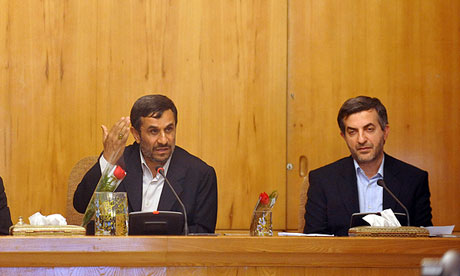Ahmadinejad looks to make confidant his successor as Iran race starts
by editor | 2013-05-08 10:14 am
![]()
Outgoing president’s aide likely to stand in election but opposition Green Movement’s leaders still under house arrestSaeed Kamali Dehghan
guardian.co.uk

Iran’s President Mahmoud Ahmadinejad, centre, with his chief of staff, Esfandiar Rahim Mashaei, right, in a cabinet meeting in Tehran. Photograph: Sajjad Safari/AP
Iran started its six-week search for a new president on Tuesday as candidates began to register for an election that will mark the end of Mahmoud Ahmadinejad’s turbulent period in office.
Dozens of hopefuls from various political groups have put their names forward for June’s presidential poll. It is the first since the 2009 election, which resulted in months of unrest, bloodshed and the arrest of hundreds of protesters, journalists and political activists.
Local media reported that 62 people took their identity cards and documents to the interior ministry on the first of the five-day registrations to announce their candidacies. Among them were a handful of serious contenders, including Hassan Rouhani, a former chief nuclear negotiator, Kamran Bagheri Lankarani, a former health minister, and Mostafa Kavakebian, a former MP. Other big players have yet to step forward for a battle between conservative “principlists”, reformists, government associates and independents. Saeed Jalili, the country’s current chief nuclear negotiator, is also a potential nominee.
Shortly after filing his candidacy, the former nuclear negotiator Rouhani pledged “constructive interaction with the world” to try to address concerns about Tehran’s atomic programme.
The interior minister, Mostafa Mohammad-Najjar, who opened the candidate registration on Tuesday via video link, warned the nominees not to violate the rules by launching their campaign before being vetted.
“The registration continues until 11 May and vetting the qualification of the candidates by the guardian council will start from 12 May,” he was quoted as saying by the semi-official Fars news agency.
When registration finishes, the guardian council’s powerful group of clergymen and jurists will examine the nominees’ competence and loyalty to the Islamic republic and pick up the final list of this year’s candidates, which is expected on 23 May, in what looks like a very tight election calendar. A three-week campaign period will follow before the vote on 14 June.
For a large number of Iran’s opposition Green Movement, which was crushed after the 2009 events, this year’s vote has little legitimacy as the opposition leaders, Mir Hossein Mousavi and Mehdi Karroubi, are still under house arrest[1].
Even so, reformists who were allied with the Green Movement do not appear to have any active plans for a boycott. In recent weeks, controls and blocks on internet traffic appeared to be boosted in possible attempts to limit opposition voices during the election period.
Rouhani and Kavakebian are both reformist candidates, but it is still unclear whether more high-profile figures such as former president Mohammad Khatami or the moderate Akbar Hashemi Rafsanjani will run.
Rafsanjani has hinted this week that he would be willing to run if the supreme leader, Khamenei, approved his decision. “I will not enter the field without [Khamenei’s] consent,” he said, according to the semi-official Mehr news agency. Khamenei’s supporters have criticised Rafsanjani, saying he sided with the Green Movement after the 2009 elections that gave Ahmadinejad a second term in office.
Under Iranian law, Ahmadinejad cannot run for a third term but he is widely suspected to be grooming his close confidant and chief of staff, Esfandiar Rahim Mashaei,[2] as a possible successor as part of a plan for a Putin/Medvedev-style reshuffle.
In recent weeks, Mashaei, whose daughter is married to Ahmadinejad’s son, has been accompanying Ahmadinejad in an extensive schedule of provincial visits[3] that opponents claim is designed to promote the former for the June elections. Pro-Khamenei conservatives have labelled Mashaei the head of a “deviant current” in Ahmadinejad’s inner circle, accusing him of undermining clerical power by advocating nationalism, putting Iran ahead of Islam, and favouring greater cultural openness.
Ahmadinejad’s unwavering support for Mashaei has cost the president a great deal of influence in Iranian politics. Ahmadinejad has been drawn into a bruising power struggle with the conservatives, many of them his former supporters, and has issued serious challenges to Khamenei, such as engaging in public spats with top-level officials.
Khamenei is thought to be tolerating Ahmadinejad only to avert any risk of greater embarrassment, especially as the president appears to be going out with all guns firing[4].
Conservatives widely predict that Mashaei will be rejected by the guardian council if he enters the race, while others say Ahmadinejad will fight to the end should that happen. Khamenei this week strongly warned officials against any plans to postpone the June elections.
- are still under house arrest: http://www.guardian.co.uk/world/2013/feb/15/call-iran-end-house-arrest-opposition-leaders
- to be grooming his close confidant and chief of staff, Esfandiar Rahim Mashaei,: http://www.guardian.co.uk/world/2013/mar/13/ahmadinejad-spring-infuriates-iranian-establishment
- has been accompanying Ahmadinejad in an extensive schedule of provincial visits: http://www.guardian.co.uk/world/iran-blog/2013/may/01/who-afraid-mahmoud-ahmadinejad-iran
- appears to be going out with all guns firing: http://www.guardian.co.uk/world/2013/feb/05/mahmoud-ahmadinejad-ayatollah-ali-khamenei
Source URL: https://globalrights.info/2013/05/ahmadinejad-looks-to-make-confidant-his-successor-as-iran-race-starts/